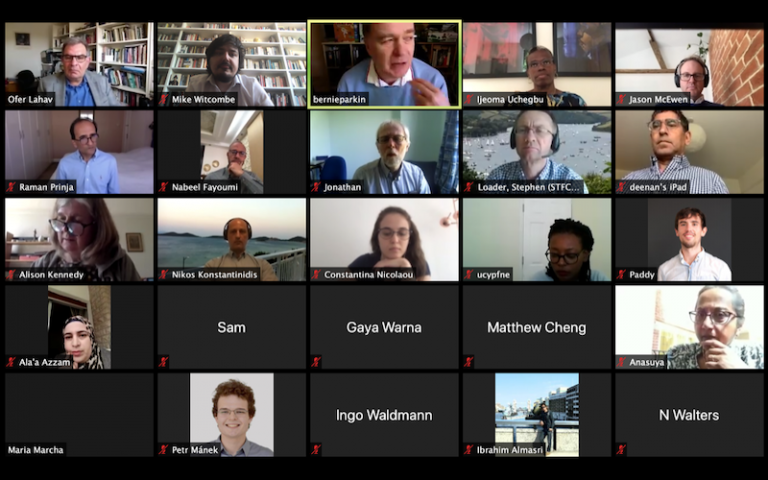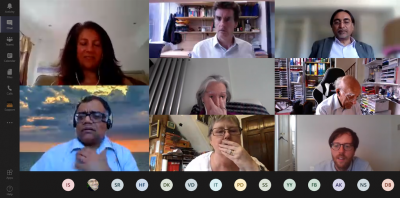UCL’s collaboration with global partners continues virtually
28 May 2020
UCL is finding innovative ways to strengthen links and collaborate with global partners during the pandemic

The COVID-19 pandemic has temporarily halted international travel, but this hasn’t stopped UCL from continuing to engage with global partners through virtual meetings and events.
Collaborating with overseas partners is now more important than ever. Not only is it bolstering world-wide research efforts that will lead towards a solution faster, but it enables knowledge exchange to help overcome shared obstacles and challenges along the way.
Since COVID-19 emerged, partners around the globe have been sharing their experiences and strategies of coping with the pandemic. UCL’s President and Provost, Professor Michael Arthur, has written to thank them personally for their ongoing support, and teams across UCL are continuing to foster global engagement virtually.
GEO regional network meetings
The Global Engagement Office (GEO) has been conducting all meetings online, including its termly regional network meetings that are hosted by regional Pro-Vice-Provosts. Holding these meetings virtually, rather than on UCL’s Bloomsbury campus, has in fact provided unique opportunities to involve colleagues from partner institutions and countries including South Korea, France, South Africa, India and Nepal.
For example, Professor Randeep Guleria, Director of the All India Institute of Medical Sciences (AIIMS), joined the South Asia regional network meeting over MS Teams on 27 May to give an update on COVID-19 in India, as well as its impact on AIIMS from an operational, educational and research perspective.

The South Asia regional network meeting on 27 May was hosted virtually on MS Teams
In addition to learning how partner institutions have been responding to the pandemic, discussions provided an opportunity to highlight UCL research taking place in the different regions, as well as showcase how academics are adapting their research in response to COVID-19.
Further plans to adapt additional activities to online settings are underway. These include a neurodegeneration symposium planned for May with the National University of Singapore and an Africa symposium, focusing on the future of partnerships and lessons learned from COVID-19, planned for the end of July.
UCL-Jordan DIS virtual launch
Also recently hosted on a virtual platform was the launch event for the UCL-Jordan Data Intensive Science (DIS) collaborative programme on 24 April. Professor Ofer Lahav, Vice-Dean (International) for MAPS, hosted the event over Zoom. Presenters included Pro-Vice-Provost (International) Deenan Pillay and Pro-Vice-Provost (Africa and Middle East) Ijeoma Uchegbu.
The collaboration extends the successful activities of UCL’s Centre for Doctoral Training (CDT) in DIS to help train the next generation of Jordanian data scientists. It is supported by a grant of £300k from the Newton-Khalidi Fund, awarded to a team led by Professor Lahav, Professor Jonathan Tennyson and others from the Department of Physics and Astronomy and MSSL.
The launch event brought together Jordanian partners from the Royal Scientific Society and the University of Jordan, UCL senior leadership, representatives from the Science and Technology Facilities Council and the British Embassy in Amman, CDT students and other interested parties.
Given the ongoing COVID-19 crisis, the programme has begun online teaching using video recordings of Dr Jason McEwen's lecture course on Machine Learning. 45 Jordanian students (62 percent of whom are female) are already engaging with the course.
Professor Lahav said: “For me, this project with Jordan is a ‘real life’ experience of how to continue external engagement in the Covid-19 situation.”
Those interested in hearing more about the UCL-Jordan DIS collaboration are encouraged to contact Project Manager Mike Witcombe (m.witcombe@ucl.ac.uk) or other members of the CDT-DIS team.
Links
Thanking UCL’s Chinese supporters during COVID-19
Cities partnerships Programme: Continued engagement during COVID-19
For the latest news about UCL’s international activity, partnerships and opportunities, subscribe to our bimonthly Global Update newsletter.
 Close
Close

